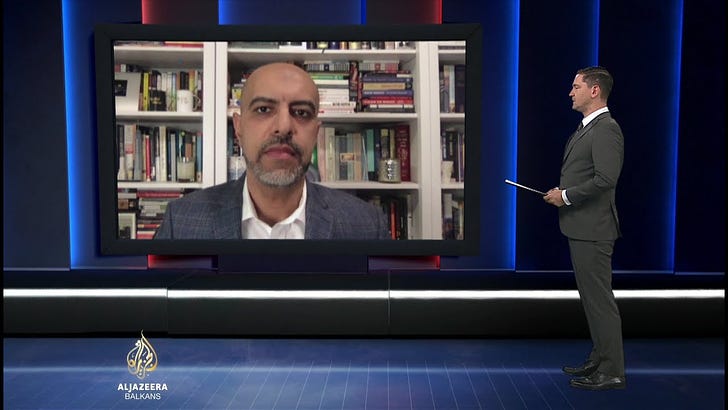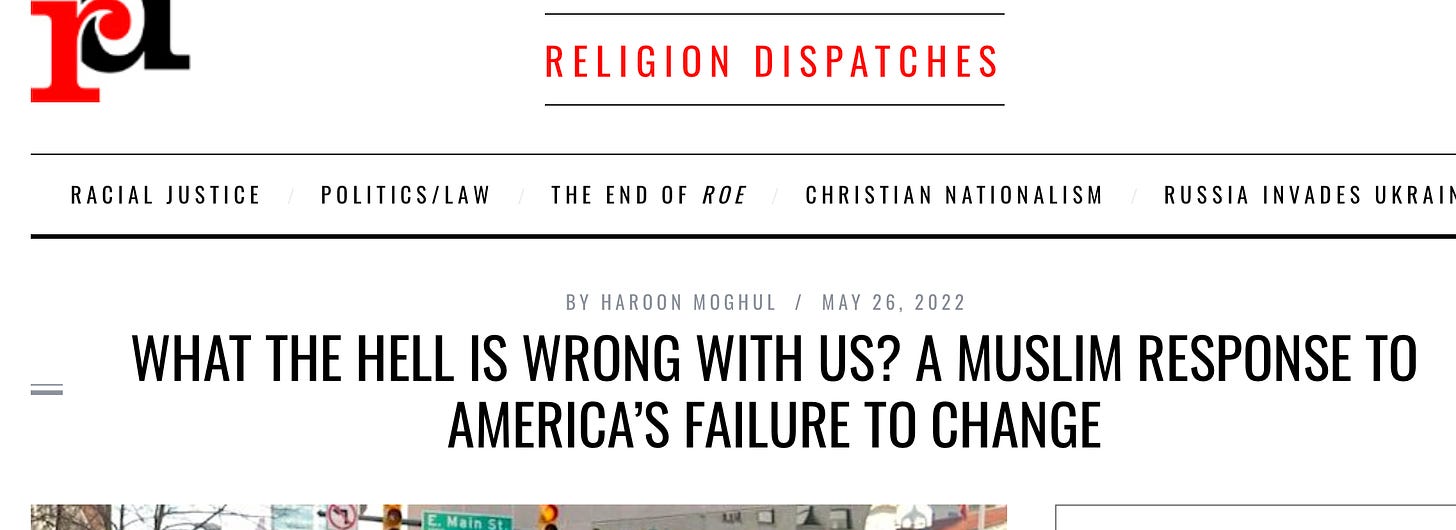Dvije milijarde halifa: vizija za muslimansku budućnost
What we to others abroad we inevitably do to each other at home.
Where and when I grew up, school didn’t end until well into June, and only started up again after Labor Day. That’s not quite how things work here in Ohio: Before Memorial Day, students are out—and then they’re back in the classroom come early August, which strikes me, meteorologically and calendrically, as a grave injustice. (Isn’t August prime swimming, biking, and ice cream weather?)
Long story short, we haven’t done any halaqas in a while, for these reasons: (1) everybody needed a pause and reset after Ramadan; (2) Abu, especially, needed to refresh and restore himself after a grueling Ramadan; (3) maybe it was compensation for two years of COVID, but this year’s Eid schedule was superbly intense (“beautifully exhausting,” as one of my wife’s friends put it.)
Oh, and also: The eldest has her end-of-year exams, and needs to focus on that, and the aforementioned Abu has a book tour. If this strikes you as entirely ordinary and unremarkable, if you think it’s totally fine to suspend even vital commitments when circumstances change, if you know that wanting a long-term outcome requires short-term adjustment, then I have news for you.
A lot of Americans seem to be entirely incapable of understanding this. They are literally willing to watch thousands of innocent people die rather than make reasonable adjustments, in the belief that an abstract right, ambiguously defined, should be maximally interpreted even in the face of the kind of harm that literally describes war zones.
I do not want this Substack to be political—but I also need to point out: This is a Substack about raising Muslim kids. Kids. In 2020, over 40,000 Americans died from gun violence. That rivals the number of people that have died in Ukraine due to the illegal, immoral, and outrageous Russian invasion of that sovereign nation. I have written about this at length, in a piece I link to below, alongside other content.
Some of that may seem more relevant. Some of that may seem less relevant. But all of it is connected by the belief that our lives have not only sacred value but inherent purpose—we are called by God to reflect and increase good in the world, or at least to fight against evil and harm in the world. How we do so is a matter of choice. All the same, we must stand in judgment for what we did and did not do.
Don’t Forget Us Here
Last week, I was on Al Jazeera Balkans, hosted by Harun Karcic, a powerful journalist. Not only was it my first time interviewed by a fellow Harun (sic), but he asked great questions and really pushed me to explore the implications of Two Billion Caliphs, especially for Muslim audiences. The full segment is below; the neatest part, though, might be that it’s subtitled in Bosnian. That’s new for me. But since the book is intended especially for Western Muslims, it holds great significance to me that I had a chance to reach more broadly into Western Muslim spaces.
Last week, I was also on Marty Moss-Coane’s great podcast, Radio Times, for a really intense discussion about Islam. I confess I’ve never been politely pushed by a thoughtful journalist who doesn’t share my faith commitments in quite the same way—and I’m glad for it. There were some intense questions about “nones,” Islam and sexuality, and then this: “Was the Prophet Muhammad ever wrong?” Listen here.
Earlier this week, I started reading Mansoor Adayfi’s shocking, heartbreaking, and vitally necessary memoir, Don’t Forget Us Here: Lost and Found at Guantanamo, which I recommend to all mature readers—a diary of his years at Guantanamo, this is on any measure a difficult but vital revelation. The heartbreaking massacre in Uvalde, Texas, unfolded while I was deep into the book, and so it hit all the more differently.
It was years ago that someone asked me—at an event, I believe in Washington state, but I am probably wrong—what the big deal about the War on Terror ultimately was. (This was an actual question.) Well, I pointed out, wrong is wrong, even if you don’t feel any (this-worldly) consequences. But among other things, I said, one day you will feel the consequences. You’ll lose moral capital, which you might one day need.
You’ll rot your soul—and your nation’s soul. (It’s an argument Spencer Ackerman makes in Reign of Terror: How the 9/11 Era Destabilized America and Produced Trump, another important read.)
And not to mention: What we do outside our borders we eventually and inevitably import into our borders. There’s no hard line between “us” and “them.” A nation that is callous to others is inevitably, eventually, if belatedly callous to itself (and the same truth holds in reverse.) Are we so inured to violence that even the repeated murder of children, the elderly, and the vulnerable leads many of us us to do nothing?
Right, Left, and Wrong
I wrote a meditation on Uvalde for Religion Dispatches—”What The Hell Is Wrong With Us? A Muslim Reflects on America’s Failure to Change”—pointing out while the American left sometimes has the unfortunate tendency of fetishizing change, as if any shift is to be welcomed, encouraged, and celebrated, without much deep regard for consequence, the American right is guilty of the opposite:
More times than I can remember, I’ve had to ascend the minbar and address a Friday congregation reeling. Many Imams will do the same painful work this week. But for many American Muslims, Buffalo and Uvalde strike in other ways. Beyond the infuriating inability of America to act is the rigid commitment of far too many Americans to their purported rights, even at the cost of thousands of lives. Of course, faiths are not countries. But both rise and fall based on how we think they work.
In recent years, many Muslim communities were devastated by fringe groups that hijacked public discourse—they didn’t understand what Islam actually was, or how it historically worked and, as such, they inflicted chaos and bloodshed wherever they took root. And this, I fear, is what’s happening in America: Instead of seeing their society as a living, dynamic moral project, which adjusts and adapts to the changing circumstances of the world, too many Americans see our nation as a rigid project whose changelessness is a mark of glory.
And no matter how many have to die—even children—they will not admit otherwise. All of it sounds awfully familiar.
Only one of these is resulting in the regular massacre of children, the elderly, and the innocent, so please do not consider this a lame both-sides-ism. I do not define myself as exclusively progressive or conservative—as I told Marty Moss-Coane, there are elements of both I find compelling (a wealthy society must invest in the health, safety, and education of all; I am socially conservative on certain moral questions) and elements of both I find concerning (I do not believe in imposing my moral beliefs, or am sanguine about their opposite being pushed, through social, cultural, let alone political institutions). More deeply, I find fault with not only narratives of polarization, but the limitations of rigid two-party frameworks and a culture of zero-sum competition, but that does not mean all error has remotely equal consequence.
I would be shocked if mosques across the country did not address this in Friday sermons—I certainly don’t believe it is the place of the preacher at the pulpit, or the imam at the minbar, to issue policy proposals, but neither is it their place to duck the big questions. We can urge our congregants to action without specifying what specific actions are best. For example, I am no expert on the issue of gun control, and would not weigh in with detailed legislative approaches, not because those aren’t important, but because others are far more qualified than I am in this regard. That said, nevertheless I do think it is beyond lunatic that we rightly have reasonable controls on what you can drink, who can drive, and where medicines can be sold… but not guns.
And if I was giving a sermon today, I would absolutely make sure to address not only the pain and heartbreak of recent shootings, but remind those gathered there: If we are Caliphs, we are called to act. We have moral obligations. And our religion is not a static list of do’s and don’ts, but a framework through which God empowers us to act morally in the world. We have lesser obligations and higher obligations, and the art of Islam, the purpose of wisdom and morality, is to help us to know how to navigate those. When the way we did things results in greater harm, then we should have the courage to think differently.
To do so is not violating our faith. It is, instead, honoring our faith. Sitting back and doing nothing—that’s the insult to God. This is a Substack for Muslim parents, and parents of faith, as well as educators and caregivers. Who care about passing their faith on. We think nothing of suspending a halaqa, or not pushing too hard on faith, when the kids are stressed out (or frankly we are). We regularly adapt our routine to the circumstances in our lives. We adjust. If we went hard in Ramadan, let’s give them time to recover. Let’s make Islam something they recognize is important without feeling resentment toward it. Every normal person does this all the time.
If a parent did not do this, that parent would be a bad parent. If you can’t follow the analogy, I don’t know what else to say.
Some Caliphs at a Bookstore
On a final and decidedly less intense note, I’ll be at Cincinnati’s finest independent bookstore, Joseph-Beth (Rookwood Pavilion), on Saturday, May 28th, from 2 - 3pm.
I’ll be signing books (for sale—or bring your copies) and happy to chat about the book, too. I can hardly recommend Joseph-Beth too much, from its formidable kids section to its enormous overall selection, its wonderful housewares, fine cafe, and restaurant, not to mention that there’s plenty in the surrounding area.
In the meantime, because God is not merciful to those who do not show mercy, let’s let us get a few days into summer break before we bring the halaqa back. I thank you for your patience, hope you are safe and well wherever you are, and, if this weekend is a long one for you, I pray it is a restorative and meaningful one.


